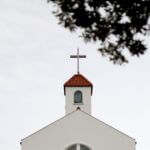Lynn Jones: Genuine worship changes us
By Lynn Jones
A church sign carried a profound invitation. The invitation read: “Come In and Altar Your Life.” That invitation gets at the heart of Christian worship. Worship is the “altaring” of our lives.
Worship began around an altar. The altar was the place of meeting between God and man. One of the things that sets man apart is that he is an altar-builder. Altars are symbols of faith and commitment. They are arrows pointing upward towards God.

The trails of God’s people in the Old Testament can be traced by their altars. At every significant crossroad you can find them. Before they chose a direction, the people of God built their altars, and in the shadow of those altars they made their choices.
The smoke of the sacrifices from their altars was “well-pleasing” to God. The smoke wafted its way toward Heaven where it was a sweet smell to Him. God loves the smoke of a sacrifice placed upon an altar.
In the New Testament story of the people of God, there was a profound change. No more literal altars were built. No fires were kindled. No sacrifices were placed on the altar.
Although no altars of wood and stone were built, “altaring” remained at the heart of man’s relationship with God. Long after the altars of stone, wood, and metal had been dismantled, altars remained important. They are places of encounter with God.
The nature of the sacrifice changed, however. Before offering other sacrifices upon our altars, we are to offer ourselves. Paul said, “Therefore, I urge you brothers, in view of God’s mercy, to offer your bodies as living sacrifices, holy and pleasing to God—which is your spiritual worship” (Rom. 12:1).
“Altaring” is at the heart of worship. Worship is not a program that we perform. It is not simply praising, praying, and preaching. It is “altaring.” It is placing our gifts, our desires, our hearts, our lives upon the altar before God. It is acknowledging His Lordship. It is making ourselves available to Him with no strings attached.
“Altaring” that is meaningful to God is costly. When David built an altar to God, Araunah offered him whatever he wanted to offer as a sacrifice. David told him, “No, I insist on paying you for it. I will not sacrifice to the Lord my God burnt offerings that cost me nothing” (1 Kings 24:24).
“Altaring” always leads to “alteration.” It is impossible to leave a place of genuine encounter with God unchanged. That change is an inward change which must soon find expression outwardly. If no alteration of life takes place, it is unlikely that we have actually “altared” our lives.
There has never been a feast without a sacrifice. And there has never been a celebration of the presence of God without an altar. The people of God are altar builders who have been altered by the power of God.
Lynn Jones is a retired pastor who lives in Oxford. He does supply preaching for churches in his area and often serves as an interim pastor. Jones is also an author, has written two books and writes a weekly newspaper column. He may be contacted at: kljones45@yahoo.com.






